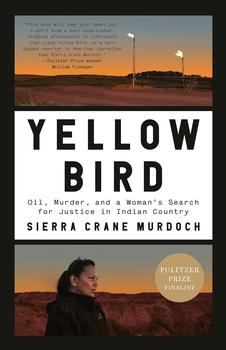Summary | Excerpt | Reviews | Beyond the Book | Readalikes | Genres & Themes | Author Bio

Oil, Murder, and a Woman's Search for Justice in Indian Country
by Sierra Crane Murdoch
Lissa was born on June 13, 1968, to Irene Yellow Bird and Leroy Chase, both members of the MHA Nation. Leroy had joined the Air Force and was not present for her birth, nor was he present for the rest of her life except on a rare phone call. Irene's mother, Madeleine, was Catholic and, since Irene was twenty-one and unmarried, arranged for a relative to take Lissa. The arrangement lasted seven months before Irene, swayed by the new radicalism of the era, decided she would not be shamed into giving up her daughter and asked for Lissa back.
It was her mother whom Lissa would later blame for the patternlessness of her life—her mother's ambition, to be exact. After they reunited, Irene dedicated herself to academic pursuits. They left North Dakota for California, where Irene enrolled again in school, then returned to North Dakota, then left for Wisconsin, where Irene pursued another degree before returning, again, to North Dakota, where she served for a while as the only Native American professor in the state. The longest Lissa and her mother remained anywhere was three years, when they lived in Bismarck, a few hours south of the reservation. They moved to the city in 1972, when Lissa was four years old, into an apartment with a single bedroom where Lissa kept a pet fish. One day, the fish died, and Irene flushed it down the toilet. Lissa could not forgive her mother for this. It seemed unfair to her that something living, which she had loved, should end up in the sewer. Her sensitivity exasperated Irene, who supposed her daughter had wanted a full burial, with a procession and drums and star quilts draped over a casket. She supposed her daughter even wanted a priest. Lissa had acquired certain habits in church, such as fashioning bowls out of paper and placing them around the apartment. "Alms for the poor!" she called when anyone came to visit. Sometimes the visitors were her mother's white, wealthier friends, but often they were family. "Alms for the poor!" she called nonetheless, shaking her bowls piously, until one day her mother had enough and scolded, "Lissa, we are the poor."
Lissa had always been like this, Irene later told me—a fanatic with a bleeding heart, giving weight to weightless things. I supposed it was a kind way of explaining her daughter's passionate tendencies, since Shauna, Lissa's own daughter, explained them to me differently. "My mom is an addict," Shauna said. She meant this in the broadest sense.
Shauna is the oldest of her mother's five children, only nineteen years younger than Lissa, a generational closeness that pressed her up against her mother's faults and made her feel them more acutely than her siblings. When Lissa started smoking crack, Shauna was eight years old. Six years later, Lissa turned to meth. But even in the years before she got high, Lissa, Shauna believed, had been prone to obsession.
Among the first of these obsessions Shauna recalled were plants. When she was in preschool, her mother had discovered an interest in growing things, and after that they kept all kinds of plants—leafy, tropical, sun-starved plants spilling from the windows of their apartment in Grand Forks, where Lissa attended college, as well as trays of vegetable starts Lissa grew from seed, though they never had any space for a garden. After that, her mother's obsessions came in all forms, sudden and indiscriminate, but each one Lissa had taken on with the faith and focus of a zealot. For a while, it had been music—Lissa taught herself to play piano—before she purchased a camera and became an ardent documentarian.
If these obsessions sounded like hobbies, Shauna insisted they were not. It had never been enough for her mother to take an interest in something. Rather, Lissa was set on being the best at everything she did. The best drug dealer. The most dogged bondswoman. The eventual leader of each organization she joined. After Lissa emerged from prison sober, she still found plenty of things to obsess about and, in fact, it seemed that sobriety intensified her fixations. According to Shauna, the only difference between the things that occupied her mother when she was sober and the things that made her high was that Lissa often abandoned the sober things with the same swiftness and ease with which they came to her. In one of their many moves, they had left the plants behind. This was one thing Shauna expected as a child, that whatever life they were living at one moment would last only so long. Always they had kept moving, from hotels to shelters, from apartments they rented to the houses of friends, and from the papery walls of all the places they lived, her mother had hatched, again and again, changed and yet the same.
Excerpted from Yellow Bird by Sierra Crane Murdoch. Copyright © 2020 by Sierra Crane Murdoch. All rights reserved. No part of this excerpt may be reproduced or reprinted without permission in writing from the publisher.
Your guide toexceptional books
BookBrowse seeks out and recommends the best in contemporary fiction and nonfiction—books that not only engage and entertain but also deepen our understanding of ourselves and the world around us.